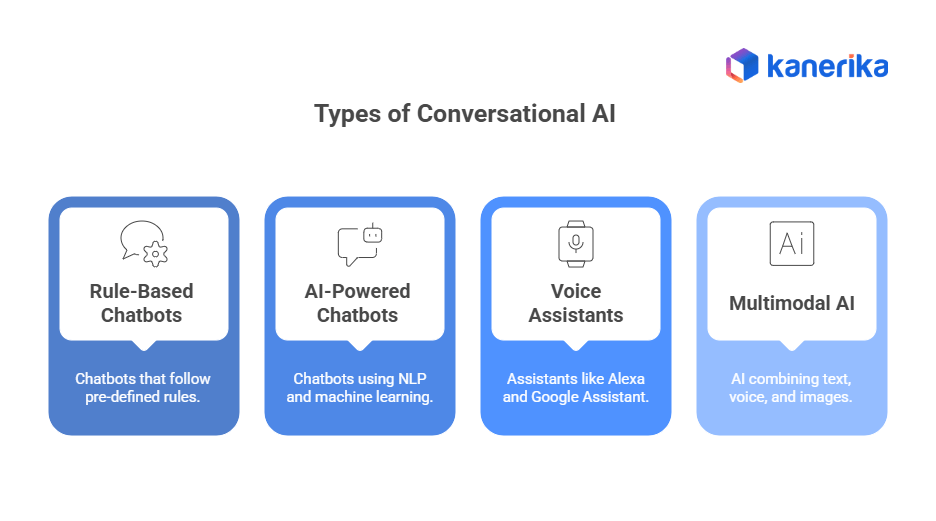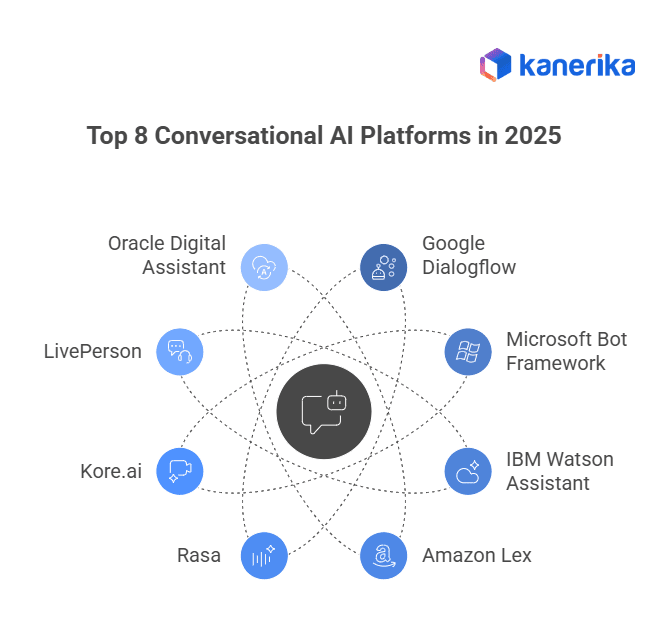In July 2025, United Airlines grounded all flights for several hours after a system-wide tech outage disrupted its conversational AI platform used in customer support. The glitch misrouted thousands of passenger queries, delayed rebookings, and caused widespread confusion at airports. Over 150 flights were canceled and nearly 180 were delayed.
Conversational AI platforms are now used in banking, healthcare, travel, and retail—but most still lack proper oversight. A recent Gartner report shows that 68% of enterprises using conversational AI have faced performance or security issues in the past year. With growing risks like hallucinations, prompt injection, and poor escalation handling, businesses need to rethink how they deploy and manage these tools.
In this blog, we’ll explain what a conversational AI platform actually does, where it fits in your enterprise stack, and how to choose one that’s secure, scalable, and reliable.
What Is a Conversational AI Platform
A conversational AI platform is a software system that enables machines to interact with humans using natural language. These platforms combine technologies like natural language processing (NLP), machine learning, and speech recognition to understand user input and respond intelligently. Unlike basic chatbots, conversational AI platforms can manage complex conversations, maintain context, and operate across multiple channels like web, mobile, and voice.
They’re used in customer support, sales, HR, and other enterprise functions to automate interactions, reduce manual workload, and improve user experience. The best platforms offer scalability, security, and integration with existing enterprise systems.
Bring AI Innovation to Your Enterprise!
Partner with Kanerika for expert AI strategies tailored to your business.
Types of Conversational AI
1. Rule-Based Chatbots
Rule-based chatbots are the most traditional type of conversational AI. They work on predefined decision trees and if/then logic. While they are fast to deploy and useful for simple queries like FAQs, they lack the ability to handle complex or unexpected conversations. Businesses often use them for basic customer support automation.
2. AI-Powered Chatbots (NLP & Machine Learning)
AI-powered chatbots represent the next stage in conversational AI evolution. By leveraging NLP, NLU, and machine learning algorithms, they can understand context, learn from past interactions, and deliver personalized experiences. These bots are ideal for customer service, lead generation, and personalized product recommendations, making them a critical part of any modern conversational AI platform.
3. Voice Assistants (Alexa, Google Assistant, etc.)
Voice assistants are conversational AI tools that rely on speech recognition and voice-based interactions. Examples include Amazon Alexa, Google Assistant, and Apple Siri. Within enterprises, voice assistants are used to enhance hands-free support, employee productivity, and smart device control, extending the reach of conversational AI platforms beyond text-based communication.
4. Multimodal Conversational AI (Text, Voice, Images Combined)
Multimodal conversational AI combines text, voice, images, and even video to create richer user experiences. For example, a customer asking about a product can receive a voice explanation, text summary, and a visual demo simultaneously. This type of conversational AI platform is becoming essential in industries like retail, healthcare, and education, where visual context matters as much as verbal interaction.

Key Components of a Conversational AI Platform
A robust conversational AI platform isn’t just about chatbots — it’s a technology stack with multiple moving parts that work together.
1. Natural Language Processing (NLP) and Understanding (NLU)
- NLP helps interpret customer queries in human language.
- NLU goes deeper, extracting intent, entities, and emotions to craft meaningful responses.
- Without strong NLP/NLU capabilities, a platform remains a basic, script-based tool.
2. Omnichannel Integration (Web, Mobile, Social, Voice)
Modern customers interact across channels. A conversational AI platform must integrate seamlessly with:
- Websites and mobile apps (live chat, in-app support).
- Messaging apps (WhatsApp, Facebook Messenger, Slack).
- Voice platforms (Alexa, Google Assistant, IVR systems).
This ensures that customers enjoy a consistent experience, regardless of where they engage.
3. Personalization and Context Awareness
The strength of a conversational AI platform lies in its ability to remember context and personalize experiences.
- Recall past interactions to avoid customers repeating themselves.
- Use CRM and customer data to make relevant suggestions.
- Tailor responses based on customer behavior and preferences.
4. Analytics, Reporting, and Continuous Learning
Data-driven optimization is key to business value. Platforms provide:
- Conversation analytics: Track customer intent, satisfaction, and pain points.
- Performance metrics: First response time, resolution time, escalation rates.
- Machine learning loops: Improve over time based on real interactions.
5. Security, Compliance, and Scalability
For enterprises, especially in regulated industries, compliance is non-negotiable. A conversational AI platform must:
- Offer data encryption and secure storage.
- Support compliance standards like GDPR, HIPAA, and PCI DSS.
- Scale to handle thousands (or millions) of interactions simultaneously across geographies.
Conversational AI vs Generative AI: What You Need to Know for AI Strategy
Learn how Conversational AI and Generative AI differ in driving real-time interactions and content creation.
Common Use Cases
The true power of a conversational AI platform is in its real-world applications. Businesses across industries use it to boost efficiency, improve CX, and unlock revenue opportunities.
1. Customer Support and Self-Service
- AI-driven chatbots handle FAQs, troubleshooting, and ticket creation.
- Customers enjoy 24/7 assistance without long wait times.
- Human agents are freed up to resolve complex cases.
2. Sales Enablement and Lead Qualification
- Conversational bots engage prospects instantly, ask pre-qualification questions, and pass qualified leads to sales teams.
- Bots can also recommend products, handle objections, and guide buyers through the sales funnel.
- Example: An e-commerce site chatbot suggesting accessories based on a user’s browsing history.
3. Personalized Marketing and Recommendations
- AI platforms use customer behavior, demographics, and past purchases to personalize offers.
- Can deliver upselling and cross-selling suggestions in real time.
- Example: A travel chatbot recommending destinations based on past trips.
4. HR and Employee Assistance
- Internal bots answer HR-related queries like leave policies, payroll details, and onboarding steps.
- Employees save time by accessing quick, automated responses.
- Example: A digital HR assistant available in Slack or Teams.
5. Healthcare, Finance, and Other Industry-Specific Applications
- Healthcare: Appointment scheduling, medication reminders, patient triage.
- Finance: Loan application support, fraud alerts, and account inquiries.
- Retail: Virtual shopping assistants, order tracking, personalized product discovery.
- Education: Student guidance, course recommendations, automated grading support.
Top 8 Conversational AI Platforms in 2025
The market for conversational AI platforms is evolving rapidly, with several leading solutions helping businesses scale automation and customer engagement. Below are the top 8 platforms dominating in 2025:
1. Google Dialogflow
Google Dialogflow is one of the most widely adopted conversational AI platforms, known for its powerful natural language understanding (NLU) capabilities.
- Seamless integration with Google Cloud and other services.
- Supports voice and text-based conversations across web, mobile, and IoT devices.
- Built-in multilingual support makes it ideal for global businesses.
- Easy deployment for customer support chatbots, virtual agents, and voice assistants.
2. Microsoft Bot Framework
Microsoft Bot Framework offers a flexible and enterprise-grade platform for building intelligent bots.
- Deep integration with Azure AI, Cognitive Services, and Microsoft Teams.
- Developers can build and connect bots across multiple channels such as web chat, SMS, Slack, and Skype.
- Customizable workflows for industries like retail, healthcare, and finance.
- Strong focus on security and compliance, which is critical for enterprises.
3. IBM Watson Assistant
IBM Watson Assistant has long been a leader in the AI space, delivering AI-powered customer care solutions.
- Combines machine learning, NLP, and automation to deliver contextual responses.
- Can handle complex conversations, including intent recognition and entity extraction.
- Prebuilt industry accelerators for banking, healthcare, and insurance.
- Advanced analytics dashboards to measure performance and customer satisfaction.
4. Amazon Lex
Amazon Lex powers Alexa, making it one of the most advanced conversational AI platforms for voice experiences.
- Fully integrated with AWS services like Lambda and CloudWatch.
- Best for building voice-enabled applications, IVR systems, and customer support chatbots.
- Offers scalability and multilingual support, suitable for businesses expanding globally.
- Pay-as-you-go pricing makes it cost-efficient for startups and enterprises alike.
5. Rasa (Open Source)
Rasa stands out as a developer-friendly, open-source conversational AI platform.
- Offers complete customization and control over conversational flows.
- Strong community support and continuous innovation.
- On-premises deployment for businesses requiring data privacy and compliance.
- Ideal for companies that want to avoid vendor lock-in.
6. Kore.ai
Kore.ai is an enterprise-focused conversational AI platform designed for scalability.
- Supports voice, text, and multimodal interactions across channels.
- Prebuilt domain-specific bots for industries like retail, telecom, and BFSI.
- Strong emphasis on low-code/no-code bot development.
- Advanced AI orchestration for seamless automation.
7. LivePerson
LivePerson focuses on customer engagement through AI-driven conversations.
- Specializes in conversational commerce and messaging platforms.
- Helps brands connect with customers via WhatsApp, SMS, and web chat.
- AI agents can seamlessly hand over cases to humans for complex situations.
- Trusted by major enterprises for retail and e-commerce use cases.
8. Oracle Digital Assistant
Oracle Digital Assistant is a comprehensive AI platform that integrates with Oracle’s business suite.
- Supports HR, ERP, CRM, and CX applications with conversational AI.
- Uses AI and machine learning to understand complex queries.
- Provides multilingual support for global enterprises.
- Designed for enterprises needing scalable automation across departments.

Business Benefits of Using a Conversational AI Platform
1. Improved Customer Experience and Engagement
Conversational AI platforms enable brands to provide personalized, real-time interactions, resulting in higher customer satisfaction.
- Tailored responses based on customer behavior and preferences.
- Omnichannel presence across web, mobile, and social media.
- Human-like conversations build trust and stronger engagement.
2. Cost Savings and Operational Efficiency
Automation reduces the need for large support teams and minimizes human error.
- Lower customer service costs by deflecting routine queries.
- Optimize workforce productivity by allowing employees to focus on complex tasks.
- Streamlined operational workflows lead to efficiency gains.
3. 24/7 Availability and Faster Resolution
Unlike human agents, conversational AI platforms work 24/7.
- Instant responses ensure faster issue resolution.
- Customers can access help at any time, improving loyalty and retention.
- Reduces wait times, especially during high-demand periods.
4. Data-Driven Insights for Better Decision-Making
Conversational AI collects valuable customer data that businesses can leverage.
- Identify trends, customer pain points, and buying behavior.
- Provide insights for product improvements.
- Enhance marketing strategies with data-backed personalization.
5. Scalability Across Markets and Languages
As businesses expand, conversational AI platforms ensure smooth scaling.
- Support for multiple languages and dialects.
- Consistent customer experience across regions and time zones.
- Flexibility to adapt to new business models and industry demands.
AI in Robotics: Pushing Boundaries and Creating New Possibilities
Explore how AI in robotics is creating new possibilities, enhancing efficiency, and driving innovation across sectors.
Case Study: Contextual Query Resolution for Member Support
Client Profile
A global knowledge-sharing platform serving over a million professionals through expert consultations, surveys, and insights.
Challenge
The client’s support team was overwhelmed by repetitive queries related to account setup, profile updates, and survey participation. Manual ticket handling through Zendesk led to delays, high support costs, and poor user experience.
Kanerika’s Solution
Kanerika deployed a context-aware conversational AI platform that integrated with the client’s knowledge base and ticketing system. The AI agent used NLP to understand user intent and resolve queries instantly. It also auto-generated ticket summaries and routed complex cases to human agents when needed.
Results
- 65% of queries resolved through self-service
- 42% reduction in ticket volume
- 31% decrease in cost per ticket
- 25% increase in member satisfaction
- Full omnichannel support across web and mobile
Kanerika’s Multi-Agent Conversational AI: Designed for Real Business Workflows
Kanerika brings deep expertise in AI/ML and agentic AI to help businesses solve real challenges and deliver measurable results. Our focus is on building purpose-driven AI agents and GenAI models that address specific bottlenecks across industries like finance, healthcare, logistics, and retail.
Our AI agents—Alan for legal summarization, Susan for PII redaction, Mike for quantitative validation, and DokGPT for document search—go beyond basic chatbots. They combine agentic AI, generative models, and custom NLP to deliver context-aware, efficient solutions tailored to each business environment. Every deployment meets enterprise-grade security standards, including ISO 27701, SOC II, and GDPR compliance.
Ready to transform your business with intelligent, compliant, and scalable AI solutions? Explore how Kanerika’s conversational AI and agentic AI expertise can drive efficiency, security, and growth for your enterprise.
Bring AI Innovation to Your Enterprise!
Partner with Kanerika for cutting-edge AI solutions that drive results.
FAQs
1. What is conversational AI?
Conversational AI is a technology that enables machines to interact with humans in natural language, using text, voice, or multimodal communication. Examples include chatbots, voice assistants, and AI-powered virtual agents.
2. What is the difference between conversational AI and generative AI?
Conversational AI focuses on understanding and responding to user inputs in real time, often within a defined context. Generative AI, on the other hand, creates new content—text, images, or audio—based on patterns it has learned from data.
3. How is conversational AI used today?
It is used in customer support, virtual assistants, lead generation, personalized recommendations, healthcare guidance, and enterprise workflows like HR and IT support.
4. What are the limitations of conversational AI?
Limitations include handling highly complex or ambiguous queries, understanding nuanced human emotions, and reliance on data quality. Some systems may also lack explainability for critical decision-making.
5. How does conversational AI improve business efficiency?
By automating repetitive tasks, answering common queries instantly, and providing 24/7 support, conversational AI reduces operational costs, enhances customer experience, and frees human agents for more complex tasks.
6. Can conversational AI understand multiple languages?
Many advanced platforms support multilingual interactions, allowing businesses to serve global audiences. However, the quality of understanding may vary depending on the language, context, and platform capabilities.










